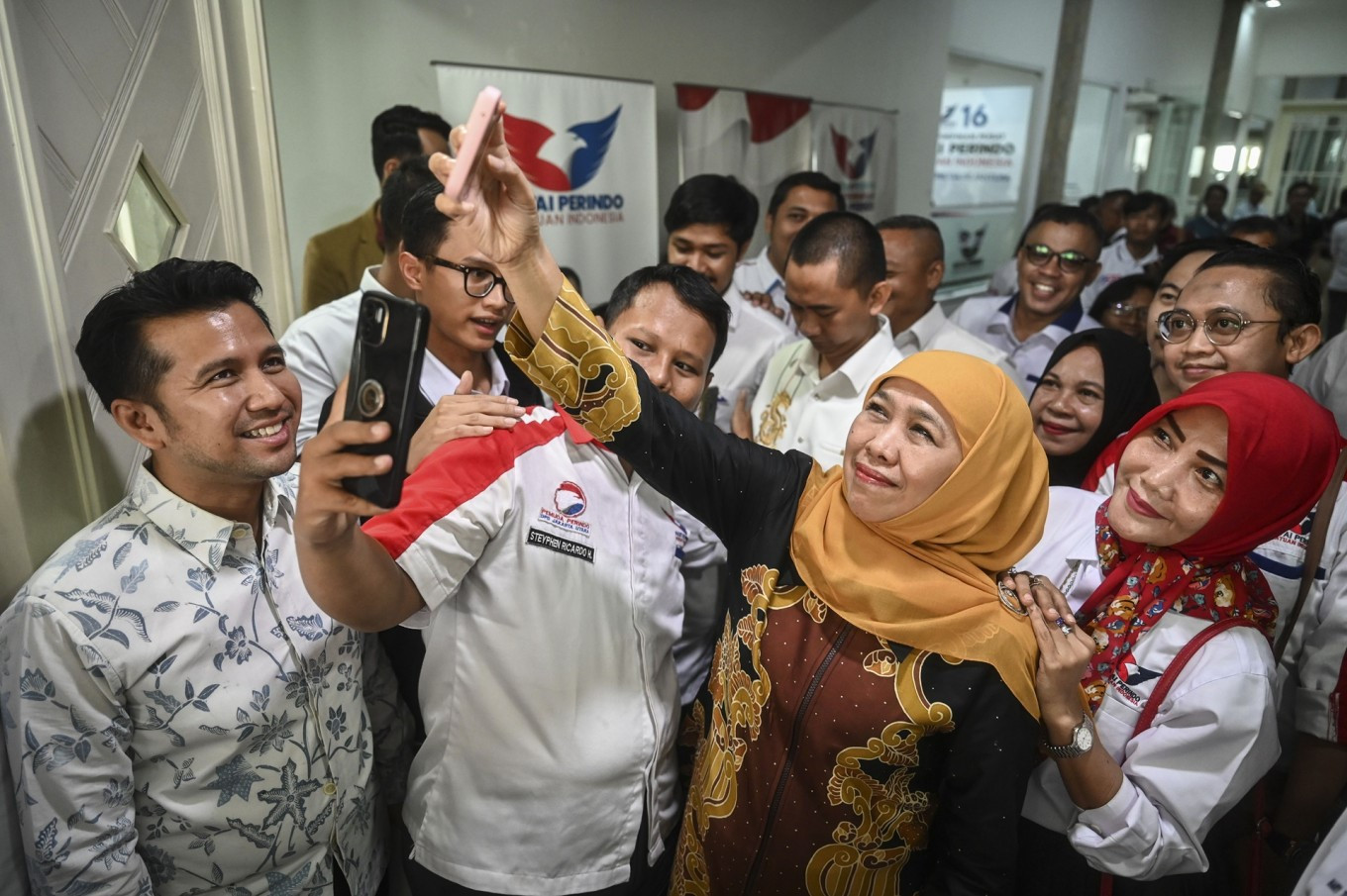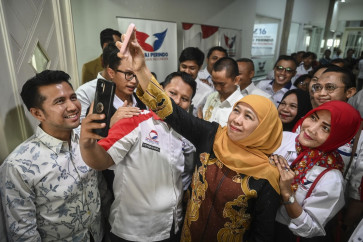Popular Reads
Top Results
Can't find what you're looking for?
View all search resultsPopular Reads
Top Results
Can't find what you're looking for?
View all search resultsAnalysis: East Java gears up for all-women gubernatorial race
Change text size
Gift Premium Articles
to Anyone
 Former East Java governor Khofifah Indar Parawansa (second right), accompanied by former deputy governor Emil Dardak (left), takes a selfie with Perindo Party officials in the party's headquarters in Jakarta on May 22, 2024 after the party declared its early support for the pair in the upcoming East Java gubernatorial election on November. (Antara/Erlangga Bregas Prakoso)
Former East Java governor Khofifah Indar Parawansa (second right), accompanied by former deputy governor Emil Dardak (left), takes a selfie with Perindo Party officials in the party's headquarters in Jakarta on May 22, 2024 after the party declared its early support for the pair in the upcoming East Java gubernatorial election on November. (Antara/Erlangga Bregas Prakoso)
T
hree women will compete for the governorship of East Java, the country’s second-most populous province and a stronghold of the country’s largest and most influential Islamic organization, Nahdlatul Ulama (NU). Unlike a few other regional head elections marred by power struggles between political elites, the East Java gubernatorial race has shaped up to be a riveting contest between candidates equally qualified for the province’s top job.
The leading contender is incumbent Khofifah Indar Parawansa, who served her first term as East Java governor from 2019 to 2024. Supported by a bloated coalition of 15 political parties, including allies of President Prabowo Subianto, Khofifah also has considerable sway over the conservative Islamic voter base, given that she leads NU’s women’s wing, Muslimat, whose network comprises over 30 million members. Moreover, it should also be noted that NU helped Prabowo win the February’s election.
Khofifah’s popularity, bolstered by a high acceptance rate, places her well ahead in the polls. According to a survey conducted by Litbang Kompas, Kompas daily’s research arm, in early November, Khofifah and her running mate Emil Dardak achieved an electability rate of 52.5 percent, far outpacing their competitors, former social affairs minister Tri “Risma” Rismaharini and House of Representatives lawmaker Luluk Nur Hamidah.
While Khofifah campaigns on the stability of her leadership, in which she advocates turning East Java into an economic hub connecting Indonesia’s eastern and western regions, Risma positions herself as a progressive alternative. Running under the banner of the Indonesian Democratic Party of Struggle (PDI-P) alongside NU youth figure Zahrul “Gus Hans” Azhar Asumta, Risma’s platform focuses on infrastructure development, promising projects focused on enhancing regional connectivity, drawing on her experience as mayor of the province’s capital, Surabaya.
However, Risma’s gubernatorial bid faces challenges, including a divided PDI-P voter base. A poll by Denny JA Indonesian Survey Circle (LSI) showed that as many as 46.7 percent of PDI-P voters plan on casting their ballot for Khofifah-Emil, while 41.2 percent will vote for the party’s candidates. The numbers are so divided that PDI-P secretary-general Hasto Kristiyanto has warned that party members who do not support Risma and Gus Hans will face sanctions. This internal split reflects the broader tendency of East Java’s electorate to prioritize individual leadership qualities over strict party allegiance, which is more commonly seen in the regional head elections. Meanwhile, Luluk and her running mate Lukmanul Khakim are backed by the National Awakening Party (PKB), of which the former is also a deputy chairperson. The pair have challenged central government policies seen as detrimental to regional interests and pushed for a transformative agenda centered on social equity and environmental conservation, an approach that targets the grassroots.
Although Luluk may not be as well-known as her two rivals, her low poll numbers may also stem from the ongoing rivalry between PKB chairman Muhaimin “Cak Imin” Iskandar and NU boss Yahya Cholil Staquf, making it more challenging for her to mobilize the numerous factions within the mass organization. Unfortunately for Luluk, the same Denny JA LSI survey also discovered that 74.1 percent of PKB voters may also end up casting their vote for Khofifah, whose incumbency gives her a significant edge.
The battle for NU’s support is what makes East Java’s gubernatorial election unique, evident in how each candidate pair claims strong ties to the Islamic organization. However, experts note that NU voters are also becoming increasingly rational, prioritizing technocratic competence over identity politics. Even on that front, Khofifah looks ready to dominate the polls on voting day on Nov. 27.


















